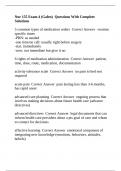Nur 155 Exam 4 (Galen) Questions With Complete
Solutions
5 common types of medication orders Correct Answer -routine:
specific times
-PRN: as needed
-one time/on call: usually right before surgery
-stat: immediately
-now: not immediate but give it no
6 rights of medication administration Correct Answer patient,
time, dose, route, medication, documentation
activity tolerance scale Correct Answer no pain to bed rest
required
acute pain Correct Answer pain lasting less than 3-6 months,
has rapid onset
advanced care planning Correct Answer ongoing process that
involves making decisions about future health care (advance
directives)
advanced directives Correct Answer legal documents that can
inform health care providers about a pts goal of care and whom
to contact for decisions
affective learning Correct Answer emotional component of
integrating new knowledge (emotions, behaviors, attitudes,
beliefs)
,allergic reactions Correct Answer unpredictable immune
responses to medications
anaphylactic reaction Correct Answer a medical emergency,
this is a severe allergic reaction
anticipatory grief Correct Answer cognitive, affective, cultural,
and social reactions to an EXPECTED death, felt by the patient
and family
bereavement Correct Answer includes grief and mourning,
inner feelings and outward expressions that a person
experiencing loss are demonstrating
care of a patient who is imminently dying Correct Answer
gentle bathing, oral care, turning and repositioning, decrease
environmental stimuli, and most importantly ensure symptoms
are controlled
caring of the family at the time of death Correct Answer -be
emphatic, positive, genuine, give them your full attention and
listening skills, provide family time with the decease so they can
say goodbye
-nurses can offer spiritual support if needed, offer hope
chronic grief Correct Answer grief reactions that do not
diminish over time
chronic pain Correct Answer postoperative pain that persists
more than 3 months and longer than 6 months, pain is on a daily
, basis and causes distress, interferes with daily functioning, can
be a complaint or disease
clinical manifestations of pain: cardiovascular Correct Answer
increased HR and systolic BP, decreased systolic BP and pulse,
can lead to chest pain and hypercoagulation
clinical manifestations of pain: endocrine Correct Answer
fever, shock
clinical manifestations of pain: gastrointestinal Correct Answer
delayed gastric emptying, constipation, weight loss
clinical manifestations of pain: genitourinary Correct Answer
decreased urine output, urinary retention, fluid overload
clinical manifestations of pain: immune Correct Answer
impaired immune function, infection
clinical manifestations of pain: musculoskeletal Correct Answer
muscle spasms, impaired mobility, weakness, fatigue
clinical manifestations of pain: respiratory Correct Answer
increased RR and bronchospasms, pneumonia, and atelectasis
clinical manifestations of pain: sensory Correct Answer dilated
pupils, rapid speech, slow speech, pallor
cognitive learning Correct Answer compromises knowledge
and material that is remembered, memorization and recall of
information (thinking, reading, learning)




